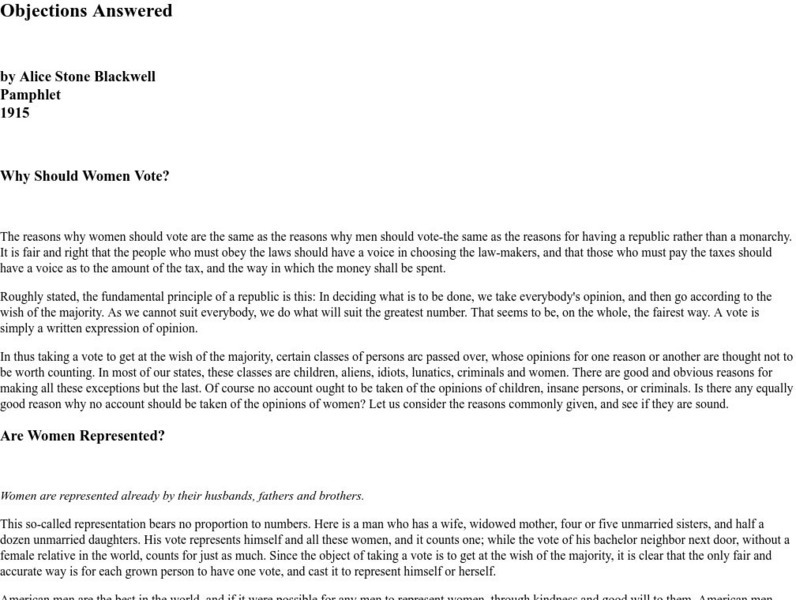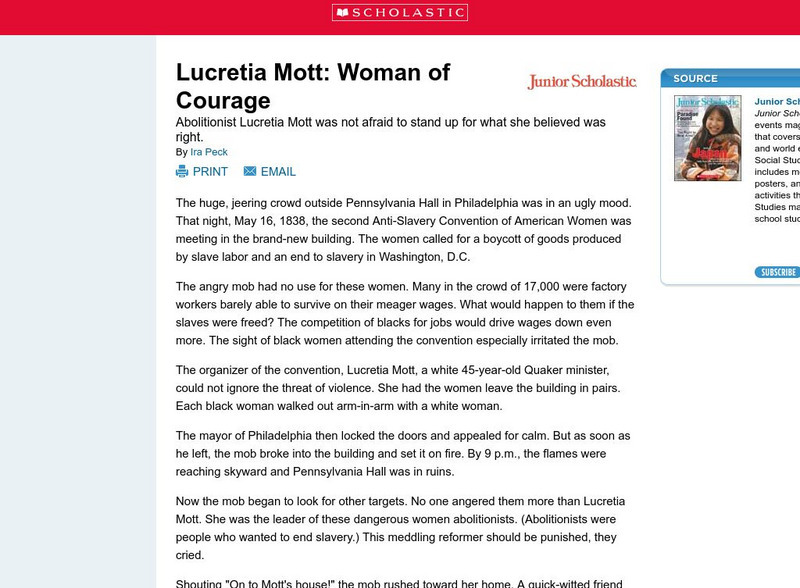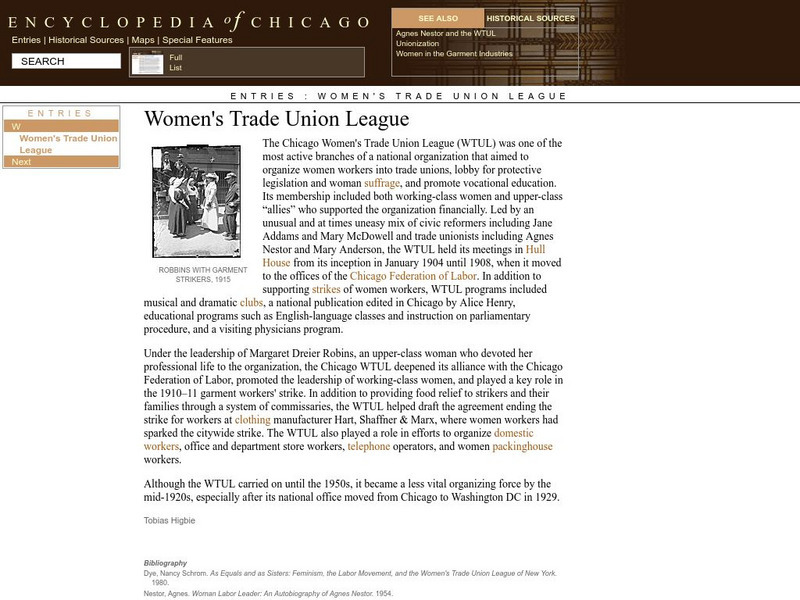North Carolina Civic Education Consortium
The Nineteenth Amendment
Beginning with an exercise of favoritism to engage learners, progressing through image and primary source analysis of the Nineteenth Amendment and the Seneca Falls Declaration, and culminating in a look at a political cartoon called...
Mr. Nussbaum
Susan B. Anthony
An interactive reading practice focuses on Susan B. Anthony. Scholars read an informational text, then answer 10 questions.
Center for History Education
Women's Rights in the American Century
Today, many young people find it hard to understand why it took over 150 years for women in the United States to get the right to vote—why there was even a need for the suffrage movement. As they read a series of primary source...
C-SPAN
Women's Suffrage and the 19th Amendment
The right to vote was hard-won after decades of organizing by women and their allies. Using a series of video clips featuring women's historians, class members consider the efforts behind the Nineteenth Amendment. Possible extension...
National Woman's History Museum
Seneca Falls and Suffrage: Teaching Women's History with Comics
As part of the study of women's history, young scholars examine Chester Comix's strips about the Seneca Falls Convention and four 19th century leaders in the struggle for equal rights. After researching other elements of the Suffrage...
National Woman's History Museum
Susan B. Anthony: She's Worth a Mint!
A instructional activity all about Susan B. Anthony showcases the Civil Rights leader's contributions towards equality. A Susan B. Anthony coin sparks engagement. Scholars take part in a discussion that sheds light on what being an agent...
National Woman's History Museum
The Power of Words and Activism: Susan B. Anthony
Where have all the activists gone? Class members compare 21st-century activism with the suffrage movement and the work of Susan B. Anthony. They begin by examining Anthony's biography and speeches to find evidence that her words and...
National Woman's History Museum
Inventive Women - Part 2
The Declaration of Independence was published in 1776. The Declaration of Sentiments and Resolutions, modeled after the Declaration of Independence, was drafted and read by Elizabeth Cady Stanton at the Seneca Falls Convention in 1848....
National Endowment for the Humanities
Who Were the Foremothers of the Women's Suffrage and Equality Movements?
Young scholars complete a unit of lessons on the women who contributed to the early Women's Rights Movement in the U.S. They conduct Internet research, examine images online, develop a list of women, complete a worksheet, and create a...
Curated OER
A More Perfect Union: Women's Suffrage and the Constitution
Students reflect on the pros and cons of Women's Suffrage and it was viewed during the late 1800's. In this history instructional activity, students will analyze documents on women's suffrage so that they can compare and contrast...
Curated OER
How Women Got the Vote: The Story of Carrie Lane Chapman Catt
Students participate in a simulation and compare and contrast the arguments for and against womens' right to vote. In this civil rights lesson, students simulate disenfranchisement of women by allowing only half of the class to vote on a...
Curated OER
Susan B. Anthony, Activist
Students examine Susan B. Anthony's life and causes she worked for. In this Susan B. Anthony instructional activity, students work in groups to research the activist roles of Susan B. Anthony and decide if she was a philanthropist....
Curated OER
Women and the Homestead Act: Creating a Place for Themselves In the West
Eighth graders examine basic elements of the Homestead Act, describe gender make-up of the West before and after the Homestead Act, connect the Homestead Act with women's suffrage, and create a modern day business propaganda pamphlet.
Curated OER
The Nineteenth Amendment: Susan B. Anthony
What would your scholars do if Susan B. Anthony walked into class? Shock them to attention with this lesson, which has the school secretary (or any willing participant) dress as the famous suffragette and answer questions as a surprise...
Curated OER
The Wyandotte Constitutional Convention: The Issue of Suffrage
Seventh graders discover details about the Wyandotte Constitutional Convention. In this Kansas history lesson, 7th graders tackle civil rights concerns as they draft persuasive speeches to secure the rights of young voters in the state.
Curated OER
What is Suffrage? Understanding the Right to Vote
Pupils discover one of the restrictions forced on women of the early 1900s. In this civil rights lesson, students investigate suffrage and why women were not allowed to vote in the early twentieth century. Pupils create a mock campaign...
Curated OER
Remember the Ladies: The Supreme Court and Women's Suffrage, Minor v. Happersett
Young scholars study the Fourteenth and Fifteenth Amendments as they examine the fight for women's suffrage. They explore the Nineteenth Amendment.
US National Archives
Nara: Teaching With Documents: Petition of Amelia Bloomer Regarding Suffrage
Amelia Bloomer was a prominent advocate of women's rights in the 19th century. She invented bloomers to replace the skirt hoop, in an effort to free women from much of their cumbersome apparel. She later used her newspaper, The Lily, to...
Other
D Archives: Alice Stone Blackwell, Objections Answered
Read this 1915 essay by Alice Stone Blackwell, who outlines the basic reasons women should be granted equal voting rights in the U.S.
US National Archives
Docsteach: Extending Suffrage to Women
In this activity, students will analyze documents pertaining to the women's suffrage movement as it intensified following passage of the 15th Amendment that guaranteed the right to vote for African American males. Documents were chosen...
National Women’s History Museum
National Women's History Museum: Black Women and Their Role in Women's Suffrage
This lesson seeks to explore the role of Black women in the Women's Suffrage Movement and their exclusion from the generally accepted Women's Suffrage narrative.
Scholastic
Scholastic: Lucretia Mott: Woman of Courage
Read about the issues that motivated Lucretia Mott to become an abolitionist and fighter for women's rights.
Chicago History Museum
Encyclopedia of Chicago: Women's Trade Union League
Read about the Chicago branch of the Women's Trade Union League and its alliance between women workers and upper-class women who supported their cause.
Other
Victory for the Vote
Read the story of the suffragists and the contemporary status of women's rights in the current political scene.























